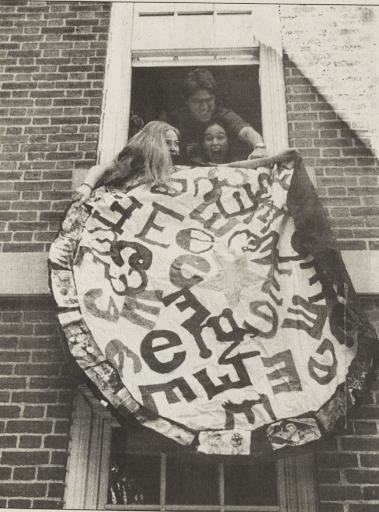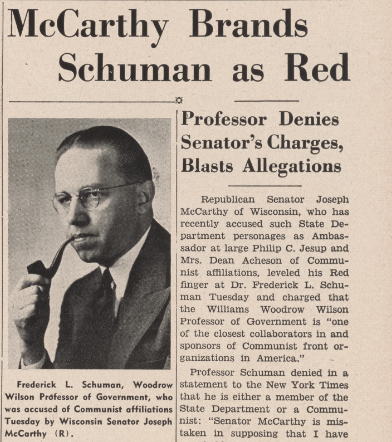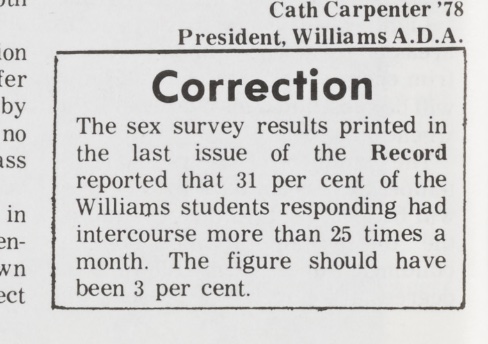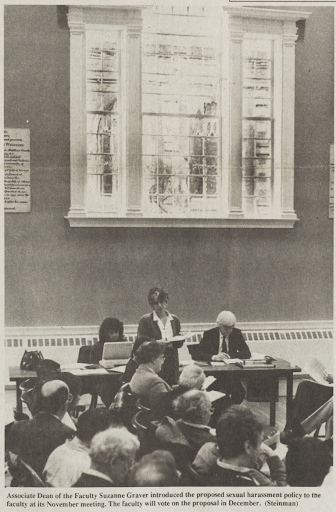
“This Week in Williams History” is a column that looks back at memorable moments in the College’s past through articles in the Record. This week in history, a professor defended modern students, the College changed its schedule, and students held a forum on bias incidents.
March 1, 1924: Professor defends the character of modern undergraduates
An article in the March 1, 1924 issue of the Record covered statements given at the Williams Alumni Club of Buffalo’s annual banquet that weekend. The speaker, then-Professor of English George B. Dutton, rebuked the negative stereotypes of college students in novels at the time — 100 years ago.
“The student of today has not the effeminacy, ineffectiveness, and tendency toward excess so often attributed to him by novelists,” Dutton said in his address. Dutton did not enumerate examples of the trend.
To prove his point, Dutton offered statistics about students at the College. He argued that 85 percent of Williams students at the time were engaged in some form of outdoor exercise — and that this held true in other institutions as well.
Dutton’s own experience as a professor informed his claims. “In literature [the modern student] has a preference for the works of Tennyson and Dickens rather than for the modern decadent novel,” he said.
“On the outside he appears sophisticated and blasé, but underneath the surface he possesses a generosity and frankness that is amazing,” Dutton concluded.
March 6, 1937: College shakes up its schedule
In February 1937, the College voted at a faculty meeting to change the weekly schedule and academic year calendars. A March 6 article in the Record detailed the changes, highlighting the vote’s intention to “eliminate conflicts and even up distribution.”
The Record reported that the new schedule would concentrate classes in the morning hours, with the exception of laboratories, advanced senior courses, and special lectures. The change, announced by then-President of the College Tyler Dennett, Class of 1904, was the result of four months of work by a committee consisting of four faculty members.
“The present system … makes some hours badly congested with classes while others have too few men in them to adequately fill sections,” the Record reported.
The new program split classes into two time-slots: Monday, Wednesday, Friday; and Tuesday, Thursday, Saturday. The classes were standardized into hour-long slots that ended five minutes before the hour.
The Record board published an editorial in response to the changes. “The new class and examination schedule does not pretend to lighten the burden of faculty and students, but it evens it up and makes the planning less complicated for the longsuffering folk who try to fit it all together every year,” the editorial board wrote.
“Inevitably there will be a tendency to steer clear of courses that mean three eight o’clocks a week during both semesters,” the editorial board added. “There may be no logical argument for wanting to sleep late; even so, human nature is sometimes too strong for even the best logic.”
Additionally, the plan unveiled a new examination schedule in order to both eliminate conflicts and spread out the frequency of exams during finals week. The Record reported that it was common prior to this change to have up to five exams in one day.
Students would take exams for their majors on different days than those for their other courses, in order to allow more time for preparation, the Record reported.
Finally, the President’s Office announced a plan to synchronize the Williams calendar for the 1937-1938 academic year with those of Amherst and Wesleyan. This part of the plan was designed by the then-Dean of Amherst C. Scott Porter.
The plan, which the Record referred to as the “Little Three project,” hoped to coordinate commencement dates and start-of-term dates with the other institutions. The plan did not standardize the dates for winter and spring vacations.
Porter argued that the schedule change would simplify scheduling athletic championships, the Record reported.
March 2, 1993: Students air grievances at Chapin Hall gathering
A March 2, 1993, Record article reported that over 700 students gathered at a forum in Chapin Hall to voice their concerns about the future of the College. The forum examined the impact of campus bias incidents — including racist, homophobic, and sexist discrimination — and the College’s capacity for change.
During the forum, eight community members — including students, faculty, and then-President of the College Francis Oakley — shared their feelings about the College’s trajectory. “We are experiencing the birth pangs of a new and vastly different society,” Oakley said in his speech.
Simeon Stolzberg ’92 opened the forum, the Record reported. “In the past year, we have faced incidents involving rape, sexual harassment, race, sexual orientation, and religion,” he said in his remarks. “The emotions we feel are immediate. Change is a constant necessity of a college community.”
Several student leaders spoke about their interests. “This forum brought together a number of different people, a number of different organizations … who all have a common goal,” College Council (CC) Co-President Deb Merriam ’93 said in her remarks.
The event sought to understand how College operations enabled these bias incidents. “We must examine the very infrastructure of the College,” said Robb Friedman ’93, the other CC co-president.
Some students expressed skepticism about the College’s capacity to change at all. “Things are cyclical here,” Asli Bali ’93 said at the forum. “We have incidents … and we have responses to those incidents.”
“Students feel that too much emphasis is placed on the role of isolated committees, which are only adding layers of bureaucracy while not promoting the desired amount of change,” the Record reported.
The biggest point of contention regarded the Dean’s Office. Many students expressed criticism that deans were not in attendance at the forum, the Record reported. “It seems that the true problem may lie in the lines of communication between students and the Dean’s Office,” the article suggested.
Students called on Oakley to take charge but also wanted to maintain leadership in the push for activism. “Bless all the students, but nothing is really going to change until these people who have the money, the time, the resources decide it’s important,” Marcienne Wright ’94 said.
Oakley reaffirmed his goals, the Record reported. “Our commitment to the reprovement of minority students and to the principles and practice of equal opportunity and affirmative action … is fully shown by faculty, administration, and trustees alike,” Oakley said. “It is an integral part of our institutional culture. As a commitment, it is firm, it is long-standing, it will endure.”












